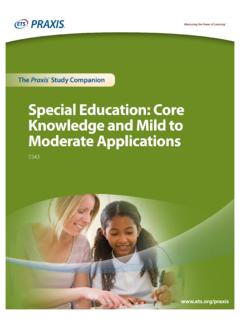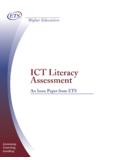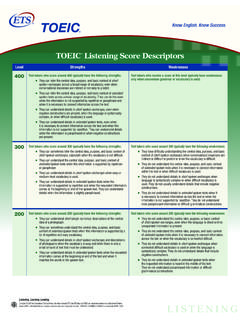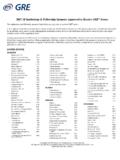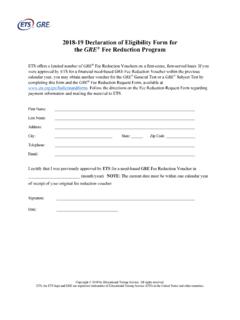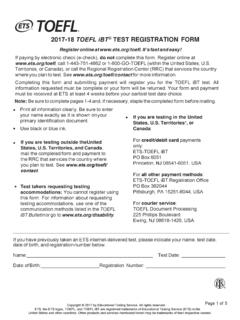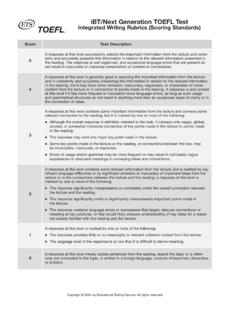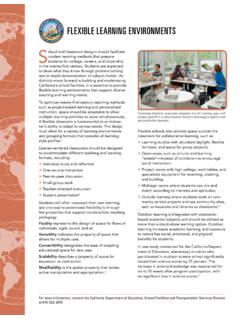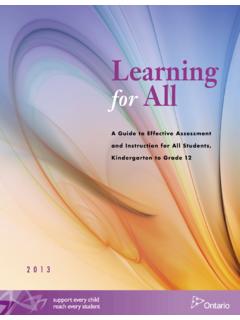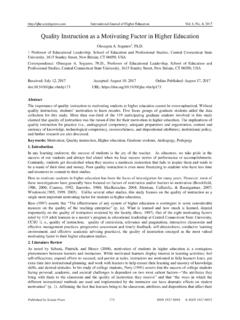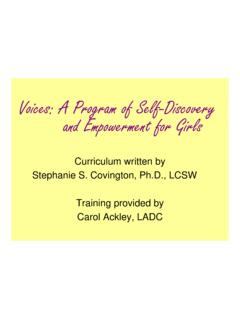Transcription of Health Education
1 The Praxis Study Companion Health Education 5551. Welcome to the Praxis Study Companion Welcome to The Praxis Study Companion Prepare to Show What You Know You have been working to acquire the knowledge and skills you need for your teaching career. Now you are ready to demonstrate your abilities by taking a Praxis test. Using the Praxis Study Companion is a smart way to prepare for the test so you can do your best on test day. This guide can help keep you on track and make the most efficient use of your study time. The Study Companion contains practical information and helpful tools, including: An overview of the Praxis tests Specific information on the Praxis test you are taking A template study plan Study topics Practice questions and explanations of correct answers Test-taking tips and strategies Frequently asked questions Links to more detailed information So where should you start?
2 Begin by reviewing this guide in its entirety and note those sections that you need to revisit. Then you can create your own personalized study plan and schedule based on your individual needs and how much time you have before test day. Keep in mind that study habits are individual. There are many different ways to successfully prepare for your test. Some people study better on their own, while others prefer a group dynamic. You may have more energy early in the day, but another test taker may concentrate better in the evening. So use this guide to develop the approach that works best for you. Your teaching career begins with preparation. Good luck! Know What to Expect Which tests should I take? Each state or agency that uses the Praxis tests sets its own requirements for which test or tests you must take for the teaching area you wish to pursue.
3 Before you register for a test, confirm your state or agency's testing requirements at How are the Praxis tests given? Praxis tests are given on computer. Other formats are available for test takers approved for accommodations (see page 33). The Praxis Study Companion 2. Welcome to the Praxis Study Companion What should I expect when taking the test on computer? When taking the test on computer, you can expect to be asked to provide proper identification at the test center. Once admitted, you will be given the opportunity to learn how the computer interface works (how to answer questions, how to skip questions, how to go back to questions you skipped, etc.) before the testing time begins. Watch the What to Expect on Test Day video to see what the experience is like.
4 Where and when are the Praxis tests offered? You can select the test center that is most convenient for you. The Praxis tests are administered through an international network of test centers, which includes Prometric Testing Centers, some universities, and other locations throughout the world. Testing schedules may differ, so see the Praxis web site for more detailed test registration information at www. The Praxis Study Companion 3. Table of Contents Table of Contents The Praxis Study Companion guides you through the steps to success 1. Learn About Your Learn about the specific test you will be taking 2. F. amiliarize Yourself with Test Become comfortable with the types of questions you'll find on the Praxis tests 3.
5 Practice with Sample Test 12. Answer practice questions and find explanations for correct answers 4. Determine Your Strategy for 19. Set clear goals and deadlines so your test preparation is focused and efficient 5. Develop Your Study 22. Develop a personalized study plan and schedule 6. Review Study 26. Review study topics with questions for discussion 7. Review Smart Tips for 31. Follow test-taking tips developed by experts 8. Check on Testing 33. See if you qualify for accommodations that may make it easier to take the Praxis test 9. Do Your Best on Test 34. Get ready for test day so you will be calm and confident 10. Understand Your 36. Understand how tests are scored and how to interpret your test scores Appendix: Other Questions You May Have.
6 38. The Praxis Study Companion 4. Step 1: Learn About Your Test 1. Learn About Your Test Learn about the specific test you will be taking Health Education (5551). Test at a Glance Test Name Health Education Test Code 5551. Time 2 hours Number of Questions 120. Format Selected-response questions Test Delivery Computer delivered Approximate Approximate Content Categories Number of Percentage of Questions Examination I. Health Education as a Discipline 20 16%. V I. II. Health Promotion and Prevention of Injury 36 30%. IV. and Disease II III. Healthy Relationships and Mental and 36 30%. III Emotional Health IV. Community Health and Advocacy 14 12%. V. Health Education Pedagogy 14 12%. About This Test The Health Education test is designed to measure the professional knowledge of prospective teachers of Health Education in elementary schools, junior high schools, and senior high schools.
7 Examinees typically have completed, or are about to complete, a bachelor's degree program in Health Education , Health and wellness, or similar program of study. The content of the test is based largely on the teacher preparation standards from the American Association for Health Education (AAHE), a subsidiary of the Society of Health and Physical Educators (SHAPE America), formerly the American Alliance for Health , Physical Education , Recreation and Dance (AAHPERD). The questions invite examinees to recall basic knowledge and to critically apply Education and Health principles. The 120 selected-response questions cover Health Education as a discipline, Health promotion and prevention of injury and disease, community Health and advocacy, healthy relationships and mental and emotional Health , and Health Education pedagogy.
8 NOTE: The recently adopted The Whole School, Whole Community, Whole Child (WSCC) model is an updated expansion of the traditional Coordinated School Health (CSH) approach. In the interest of fairness, and to allow time for educator preparation programs to integrate such changes into their curricula, Praxis material will continue to reference the coordinated school Health (CSH) approach until further notice. This test may contain some questions that will not count toward your score. The Praxis Study Companion 5. Step 1: Learn About Your Test Test Specifications Test specifications in this chapter describe the knowledge and skills measured by the test. Study topics to help you prepare to answer test questions can be found on page 26.
9 I. Health Education as a Discipline E. Concepts of physical fitness and Health -related fitness ( , body composition, cardiorespiratory A. Major Health behavior theories ( , stages of endurance, flexibility, muscular strength, and change, behavioral change theory, endurance, FITT). transtheoretical model, Health belief model). F. Nutrition B. Health -related data using appropriate research methods ( , surveys, observations, G. Stress management and coping skills questionnaires, use data to draw conclusions) H. Reduce and prevent Health risks C. Valid and reliable data sources and databases I. Anatomy, physiology, and body system ( , YRBSS, NIH, CDC, SHAPE America, AMA, interrelationships WHO, peer-reviewed journals).
10 J. Personal hygiene D. Tools for conducting an assessment of school Health needs ( , comprehensive school Health K. Behaviors that can compromise Health or safety plan, surveys, needs assessment, The Whole L. Relationship between lifestyle choices and Health School, Whole Community, Whole Child (WSCC) outcomes model). M. Effects of substance use and abuse ( , E. Curricular and extracurricular programs for physiological, psychological, legal, societal student Health needs impact). F. Appropriate educational materials from N. Care for injuries and sudden illnesses ( , first aid, professional organizations, agencies, and CPR, AED use, 911 and emergency services). associations that meet the needs of diverse audiences III.
